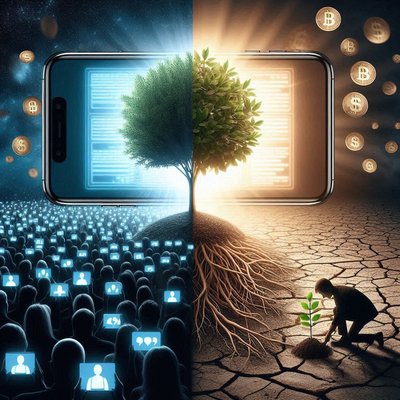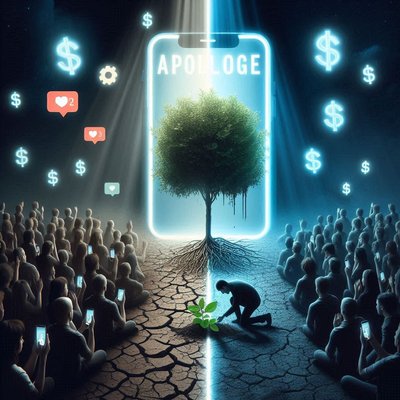Apology Videos, Critical Thinking, and the Danger of Instant Forgiveness

This is a publication based on the suggested topic proposed in the Hive Learners community through their discord, which on this occasion is "APOLOGY VIDEOS".
"The true test of character is not how much we know how to do, but how we behave when we don’t know what to do."
<< John Holt >>


Bing AI
Greetings, dear readers and visitors of this blog. Today's topic is apology videos.
I have always seen it as very common for a person to make a mistake and then make a video apologizing, knowing that this is going to give a lot of publicity, create noise, attract viewers, generate interactions, and yield dividends.
This is a practice that has been common for thousands of years. Just look at the religious aspect I bring to the table this time.
We will see how, simply, if you are a sinner and have committed a sin, you ask for forgiveness, and the priest intervenes to grant it.
This dynamic is not exclusive to the church.
The same happens on social networks. People feel satisfaction in asking for forgiveness because they know they will be forgiven.
In this Catholic tradition, followers have grown accustomed to the idea that they can commit any sin, even the most abominable or mortal, and still receive forgiveness.
Starting from that tradition, a mentality has emerged—a kind of "fascism"—where, in addition to generating dividends through apology videos, followers overlook the transgressions of the person who apologizes.
I have seen many cases, not just influencers, but ordinary people who believe that by making a public apology video, they will automatically be forgiven.


Bing AI
This brings us to today's first question:
Does this approach hold any real weight?
It is difficult to say, but we can argue that it does, primarily because it generates interaction and noise.
As I mentioned earlier, this will create monetary or financial dividends for the person making the video.
For influencers, it translates to significant profits. For ordinary individuals, their close networks of friends and acquaintances will relay their apology to the affected parties.
Take, for example, people who have committed crimes—theft, assault, or even serial killers who apologize to victims' families after causing irreparable harm.
While such apologies may carry some weight, I doubt their true value post-crime.
I believe apologies hold more weight if the person demonstrates genuine efforts to repair their mistakes.
For someone who has taken lives, true repentance might involve dedicating their resources or labor to support the victims' families.
Only through tangible actions can one offer a meaningful apology to society.
Now, how can we discern if an apology is genuine?
This delves into a complex field.
Experts in neurolinguistic programming, communication, or body language might analyze gestures, posture, or even use tools like a pen test.
However, I believe sincerity is felt through energy and time. If the person avoids repeating the mistake and proves through long-term behavior that they have changed, we can trust their apology.


Bing AI
What other measures do I suggest?
The most crucial step is educating new generations to think critically.
They must reject immediacy and understand that everything in life requires a process. A fruit does not ripen instantly—it transitions from unripe to nourishing over time.
Similarly, young people must learn to analyze problems, seek alternatives, and value education.
This prevents a world of "brainless" individuals who expect instant forgiveness through videos or religious rituals.
You cannot repair the damage of destroyed lives, murder, theft, or corruption with a video.
True reparation demands a maturation process and consistent actions over time. Only then can an apology be legitimate.
Thank you for reading, and I hope you enjoyed today’s discussion on apology videos.

This is my black cat "manclar", this account is to honor his dead (it happened years ago).

Visit the Neon Strike discord, the game of the future today!
 (Discord)
(Discord)
Credits:
Thumbnail image maded using Bing AI and edited with Canva.com
The text dividers were made by me using aseprite
Post translated from spanish to english using Deepseek AI
Hi @manclar, I totally agree with what you say. If there is no redress apologies are just a permission to make new “mistakes”.
A hug.
Like everything in life. I hope they reveal the mystery of the turnover in your country, I am very curious and attentive to it.
All the best.
I mostly don't see the needs of doing all of these things publicly I feel it is nothing but attention seeking. for someone to really apologize one must really show true repentance as you have highlighted.
Yes, it is like a need to feed the ego, it is narcissism. For that reason I do not believe in those apologies for videos, they seem so pre -designed, so artificial.
Did you know that delegating your HP to @midnight-studio not only supports amazing projects, but also rewards you with NEON Tokens every week?
I love this.
Apology videos indeed can be superficial, and instant forgiveness can be problematic. If you say you are sorry, then you need to really change, must be accountable and take good/tangible actions to mean your apology, it goes beyond words.
Thanks for sharing.
🤝
The truth is that today they take advantage of good people, they pretend it hurts them to take advantage.
Thanks to you for your intelligent comment!
!pizza
Exactly, they are not all about apologizing at all, its just for eye service, most of it are just staged and planned, no genuineness or true remorse.
Very much welcome.
Thanks a lot.
As in ehn... It's just like saying that a simple "sorry" is enough to make up for whatever transgression may have been done in the past. An apology video should only be seen as a starting point of what would be a long road to penance.
@tipu curate 8
Que esperas para unirte a nuestro trail de curación y formar parte del "proyecto CAPYBARA TRAIL"
Upvoted 👌 (Mana: 0/75) Liquid rewards.